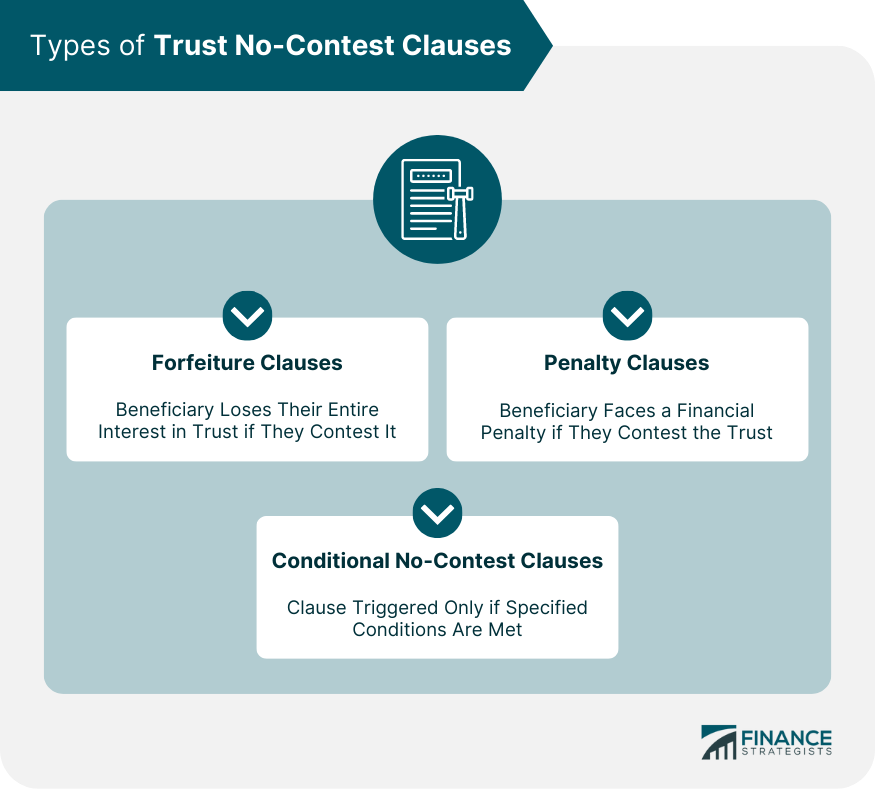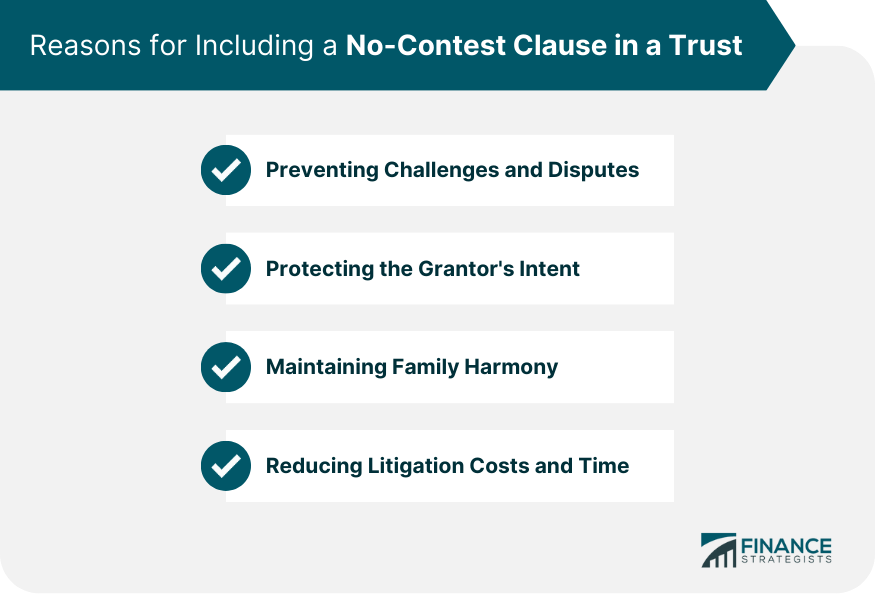A trust no-contest clause is a provision in a trust document that discourages beneficiaries from challenging or contesting the terms of the trust. If a beneficiary contests the trust and loses, the no-contest clause may result in the forfeiture of their inheritance or other penalties. The primary purpose of trust no-contest clauses is to discourage beneficiaries from initiating costly and time-consuming legal disputes over the trust. By penalizing beneficiaries who contest the trust, no-contest clauses aim to preserve the grantor's wishes and maintain family harmony. The enforceability of trust no-contest clauses varies depending on the jurisdiction. Some states, like California, generally enforce no-contest clauses, while others, like Florida, consider them to be against public policy and do not enforce them. It is essential to consult with an attorney to determine the enforceability of a no-contest clause in your jurisdiction. Forfeiture clauses are the most common type of no-contest clause. These provisions state that a beneficiary who unsuccessfully challenges the trust will forfeit their entire interest in the trust, effectively disinheriting them and deterring them from contesting the trust. Penalty clauses impose a specific financial penalty on a beneficiary who unsuccessfully challenges the trust. The penalty might be a reduction in their inheritance or a requirement to pay a specified sum to other beneficiaries or the trust itself. Conditional no-contest clauses are triggered only if certain specified conditions are met. For example, the clause might apply only if the beneficiary contests the trust within a certain time frame or if the beneficiary does not meet specific requirements outlined in the trust document. No-contest clauses are intended to prevent costly and time-consuming legal disputes by discouraging beneficiaries from challenging the trust. By penalizing beneficiaries who contest the trust, grantors hope to deter beneficiaries from initiating litigation and to protect the trust's assets. Trust no-contest clauses help preserve the grantor's intent by reducing the likelihood of beneficiaries contesting the trust provisions. By minimizing the risk of disputes, the grantor's wishes, as expressed in the trust document, are more likely to be upheld and followed. By discouraging legal disputes, no-contest clauses can help maintain family harmony. Disputes over trusts can cause significant rifts within families, and no-contest clauses aim to prevent these divisions by discouraging beneficiaries from initiating litigation that could lead to family discord. No-contest clauses can help reduce the financial and time burden associated with litigation. Trust disputes can be expensive and time-consuming, and by discouraging challenges to the trust, no-contest clauses can help ensure that trust assets are used for their intended purposes rather than being consumed by legal fees and expenses. For a trust no-contest clause to be valid and enforceable, it must be clearly and specifically included in the trust document. This means that the language used should be unambiguous and leave no doubt as to the grantor's intentions regarding the consequences of contesting the trust. To be valid and enforceable, a trust no-contest clause must comply with the laws and regulations of the jurisdiction governing the trust. Some states enforce no-contest clauses, while others consider them unenforceable or against public policy. Therefore, it is crucial to consult with an attorney familiar with the laws in the relevant jurisdiction when drafting a no-contest clause. For a no-contest clause to be enforceable, beneficiaries must be given sufficient notice of the clause and its implications. This typically means that the clause should be clearly stated in the trust document and that beneficiaries should be informed about the existence of the no-contest clause and the consequences of contesting the trust. A valid no-contest clause should contain reasonable and enforceable provisions. Courts may find overly punitive or unreasonable clauses to be unenforceable, especially if they violate public policy or the rights of the beneficiaries. A well-drafted no-contest clause should strike a balance between deterring contests and respecting the rights of the beneficiaries. One of the primary exceptions to the enforcement of a no-contest clause is when a beneficiary has probable cause to contest the trust. If the beneficiary can show that their challenge was based on a reasonable belief that the trust was invalid, a court may not enforce the no-contest clause, even if the beneficiary ultimately loses the contest. Trust no-contest clauses may be deemed void or invalid if they are contrary to the laws of the governing jurisdiction or if the trust document itself is found to be invalid. In such cases, the no-contest clause would not be enforceable, and beneficiaries could challenge the trust without facing the penalties outlined in the clause. No-contest clauses typically do not apply to challenges based on allegations of undue influence or fraud in the creation or amendment of the trust. If a beneficiary can successfully prove that the grantor was subject to undue influence or fraud, the no-contest clause would not be enforced, and the beneficiary would not face any penalties for contesting the trust. Certain jurisdictions may have statutory limitations or exemptions related to no-contest clauses. For example, some states may allow specific types of contests, such as those related to fiduciary misconduct, without triggering the no-contest clause. It is crucial to understand the laws in the relevant jurisdiction when drafting and interpreting a no-contest clause. To create an effective no-contest clause, it is important to use clear and unambiguous language. The clause should be easily understood by the beneficiaries and leave no doubt about the grantor's intentions or the consequences of contesting the trust. An effective no-contest clause should be tailored to the specific circumstances of the trust and its beneficiaries. This includes considering the grantor's unique goals and the dynamics among the beneficiaries to craft a clause that addresses potential conflicts and disputes. To help mitigate potential trust disputes, a well-drafted no-contest clause may include provisions for alternative dispute resolution methods, such as mediation or arbitration. These methods can help resolve conflicts without resorting to costly and time-consuming litigation and may be a more effective way of preserving family harmony. A well-drafted no-contest clause should be periodically reviewed and updated as needed to ensure it remains relevant and enforceable. Changes in the law, family dynamics, or the grantor's wishes may necessitate revisions to the no-contest clause to ensure it continues to serve its intended purpose and remains consistent with the grantor's objectives. One of the most significant consequences of violating a no-contest clause is the potential forfeiture of the beneficiary's inheritance or trust benefits. If the clause is enforced, a beneficiary who unsuccessfully challenges the trust may lose their entire interest in the trust, effectively disinheriting them. Violating a no-contest clause can result in substantial legal costs and fees for the contesting beneficiary. In addition to potentially forfeiting their inheritance, the beneficiary may also be responsible for the legal fees of other parties involved in the dispute, such as the trustee or other beneficiaries. Trust disputes can lead to strained family relationships, as beneficiaries may find themselves pitted against one another in court. Violating a no-contest clause can exacerbate these tensions, potentially causing long-lasting rifts among family members. Contesting a trust with a no-contest clause can lead to prolonged litigation and delays in the administration of the trust. These delays can be costly and time-consuming, diverting trust assets away from their intended purposes and creating additional stress for all parties involved. Understanding trust no-contest clauses is essential for both grantors and beneficiaries. These clauses can play a significant role in preserving the grantor's intent, maintaining family harmony, and minimizing litigation costs. It is crucial for beneficiaries to understand the potential consequences of contesting a trust with a no-contest clause. A well-drafted no-contest clause should strike a balance between protecting the grantor's intent and respecting the rights of the beneficiaries. While discouraging contests can help prevent disputes and protect the grantor's wishes, it is also essential to ensure that beneficiaries' legitimate concerns are not unduly stifled by the no-contest clause. Legal counsel plays a critical role in drafting and interpreting trust no-contest clauses. An experienced attorney can help draft a clause tailored to the specific circumstances of the trust and ensure it complies with the relevant jurisdiction's laws. Legal counsel can also assist beneficiaries in understanding the implications of a no-contest clause and guide them through any potential challenges or disputes.What Are Trust No-Contest Clauses?
Types of Trust No-Contest Clauses
Forfeiture Clauses
Penalty Clauses
Conditional No-Contest Clauses

Reasons for Including a No-Contest Clause in a Trust

Preventing Challenges and Disputes
Protecting the Grantor's Intent
Maintaining Family Harmony
Reducing Litigation Costs and Time
Legal Requirements for Valid No-Contest Clauses
Specificity in the Trust Document
Compliance With State Laws and Regulations
Sufficient Notice to Beneficiaries
Reasonable and Enforceable Provisions
Exceptions and Limitations of Trust No-Contest Clauses
Probable Cause for Contesting
Void or Invalid Clauses
Challenges Based on Undue Influence or Fraud
Statutory Limitations and Exemptions
Strategies for Drafting an Effective No-Contest Clause

Clear and Unambiguous Language
Tailoring the Clause to the Specific Trust and Beneficiaries
Providing for Alternative Dispute Resolution Methods
Periodic Review and Updating of Trust Documents
Potential Consequences of Violating a No-Contest Clause
Forfeiture of Inheritance or Trust Benefits
Legal Costs and Fees
Strained Family Relationships
Prolonged Litigation and Delays in Trust Administration
Final Thoughts
Trust No-Contest Clauses FAQs
Trust no-contest clauses are provisions in trust documents that discourage beneficiaries from challenging or contesting the terms of the trust. They are included to prevent legal disputes, protect the grantor's intent, maintain family harmony, and reduce litigation costs and time associated with challenges to the trust.
No, the enforceability of trust no-contest clauses varies depending on the jurisdiction. Some states, like California, generally enforce no-contest clauses, while others, like Florida, consider them to be against public policy and do not enforce them. It is essential to consult with an attorney to determine the enforceability of a no-contest clause in your jurisdiction.
There are several exceptions to the enforcement of trust no-contest clauses, including probable cause for contesting, void or invalid clauses, challenges based on undue influence or fraud, and statutory limitations and exemptions. In these situations, a beneficiary might be able to contest the trust without triggering the penalties outlined in the no-contest clause.
Violating a trust no-contest clause can result in several potential consequences, such as forfeiture of inheritance or trust benefits, legal costs and fees, strained family relationships, and prolonged litigation and delays in trust administration.
An experienced attorney can help draft a well-tailored trust no-contest clause that complies with the relevant jurisdiction's laws and takes into account the specific circumstances of the trust and its beneficiaries. Legal counsel can also assist beneficiaries in understanding the implications of a no-contest clause and guide them through any potential challenges or disputes related to the trust.
True Tamplin is a published author, public speaker, CEO of UpDigital, and founder of Finance Strategists.
True is a Certified Educator in Personal Finance (CEPF®), author of The Handy Financial Ratios Guide, a member of the Society for Advancing Business Editing and Writing, contributes to his financial education site, Finance Strategists, and has spoken to various financial communities such as the CFA Institute, as well as university students like his Alma mater, Biola University, where he received a bachelor of science in business and data analytics.
To learn more about True, visit his personal website or view his author profiles on Amazon, Nasdaq and Forbes.











